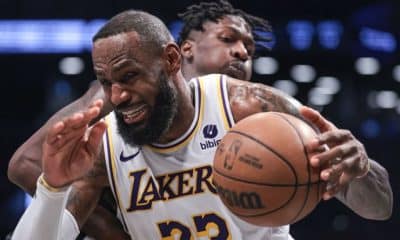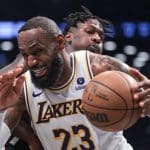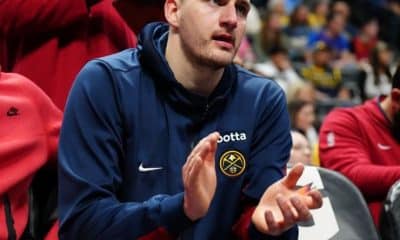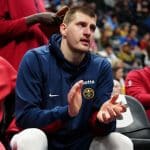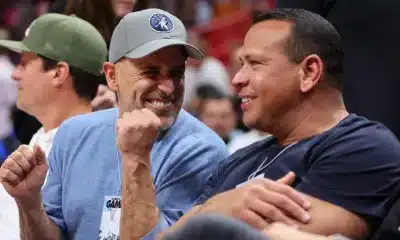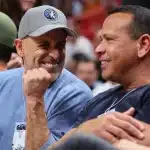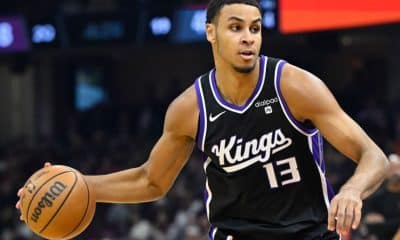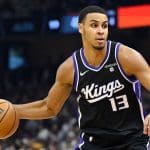NBA
NBA PM: End-of-Career Team Changes
Paul Pierce’s end-of-career team changes worked out well, but other NBA stars haven’t been so lucky.
End-of-Career Team Changes
Most people love the idea of Paul Pierce playing with the Los Angeles Clippers this season, mostly because he’ll be reunited with Doc Rivers following a fun playoff run during which he showed he still has plenty of gas left in the tank.
With that said, it’s still weird to think of Pierce wearing Brooklyn black or Washington red, white and blue. It’ll be equally strange to see him in those silly-looking new jerseys the Clippers will wear next year. He’ll always be a Celtic to most fans, but he certainly isn’t the first great player to have a change or scenery or two in the last few years of his career.
Other stars, many of whom are now Hall-of-Famers, were not blessed with the same kinds of positive opportunities at the end of their careers. The following list is comprised of the most unfortunate late-career situations for great players. Old, washed up, but not yet ready to quit the game or give up on a hefty yearly NBA salary, these players ended up with the most depressing end-of-career team switches:
#5 – Allen Iverson, Detroit Pistons and Memphis Grizzlies – It was kind of weird seeing A.I. in a Nuggets jersey, but we got used to it. The same can be said of him in a Pistons uniform. Those three games for the Grizzlies, however, never really resonated, which might be why he left the team after so short a tenure. He didn’t like his life as a bench player, so he quit. There was a bit of redemption later in 2009 as he found his way back to Philadelphia, where at least the fans were happy to see him. He never really re-gained his form, but it put those odd seasons in Detroit and Memphis in the rear-view mirror.
#4 – Moses Malone, San Antonio Spurs – San Antonio thought they’d get some bargain frontcourt help by signing a 40-year-old Malone in 1994, but he ruptured a tendon in his leg early in the season and missed all but 17 games. A solid season the year before in Philadelphia told him he still had something left to give. Seventeen games at 2.9 points per contest proved otherwise.
#3 – Hakeem Olajuwon, Toronto Raptors – In 2001, Olajuwon was unable to negotiate a new contract with the Houston Rockets because the championship years were clearly over for them at that point and Steve Francis had just won Rookie of the Year the previous season. It was time to rebuild, but The Dream wasn’t ready to quit basketball. He ended up getting a reasonable deal to play one final season in Canada, where he averaged career-lows of 7.1 points and six rebounds for the Raptors.
#2 – Bob Cousy, Cincinnati Royals– Cousy couldn’t have asked for a better send-out to his NBA career, retiring at age 35 after having won six NBA championships and an MVP trophy as a member of the Boston Celtics. Six years later, however, he was offered a job to coach the Cincinnati Royals, and as a ruse to boost ticket sales, Cousy hit the court once again at age 41. He barely played, but ticket sales jumped 77 percent. He undoubtedly made some great money in those final games in Ohio, but the price paid was a couple sacks of dignity. But if we can pretend like Michael Jordan’s Washington stint never happened, we can surely strike this Cousy stuff from the record too, right?
#1 – Patrick Ewing, Seattle SuperSonics and Orlando Magic – In making a pretty atrocious trade that returned the New York Knicks Glen Rice, Luc Longley and a bunch of garbage, the Knicks gave up on a roster centered around Ewing by sending him to Seattle. A year later, the Sonics decided they didn’t really need Ewing, either, so he finished his career with the Magic, wearing No. 6 (Grant Hill had No. 33 at the time) and stinking up the joint. He ended up averaging career lows of six points and four rebounds that season and started only four out of the 65 games he played.
What makes this the worst is that nobody wanted or needed one of the best centers of his era at his age. In other situations, the guys were given a shot by a team who still really believed there was gas in the tank, and often the veteran star knew what his new role on the team will be. Ewing never really had that after leaving New York and Seattle, which is part of what made it so sad. At least he’s been able to see some success as a coach, though he’s still waiting for his first opportunity for a head gig.
Honorable Mention:
Dominique Wilkins, Orlando Magic – After the 1994-95 season, the market for ‘Nique was so bad that he actually had to take his talents to Greece and later Italy. His last playing season, however, was with the NBA’s Magic, where he played in only 27 games and averaged a meager five points and 2.6 rebounds per game. At least he got to play that final season with his brother, Gerald.
Dave Bing, Washington Bullets and Boston Celtics – An all-time favorite in the minds of long-time Pistons fans, Bing spent his last three seasons split between the Bullets and Celtics. His scoring and assist numbers dropped considerably those last couple of seasons, but Bing was still a respectable role player.
Tiny Archibald, Milwaukee Bucks – After his Celtics were swept in the playoffs by the Bucks in 1983, that’s who Archibald decided to sign his final NBA contract with. He played 46 games with Milwaukee that season, averaging single-digit scoring numbers for the first and only time of his career before retiring mid-season.
Dave Cowens, Milwaukee Bucks – After retiring from the Boston Celtics in 1980, Cowens took a couple of years off before being goaded by buddy Don Nelson into returning for one more run, this time with the Bucks. He played in only 40 games that season, putting up the worst numbers of his professional life. With that said, he did manage to sweep Boston out of the postseason. After getting bumped in the next round, Cowens retired for good.
George Gervin, Chicago Bulls – The Iceman came to the NBA with the rest of the ABA studs in 1976 and saw a ton of success (particularly scoring the ball—few have ever done it with as much ease as Gervin) with the San Antonio Spurs. His final year in the NBA, however, was with the Chicago Bulls, who were grooming reigning Rookie of the Year Michael Jordan at the time. Luckily for Gervin (but not for Jordan), MJ broke his foot that season and missed all but 18 games, giving The Iceman the opportunity to still be productive. Had Jordan played all year, who knows how frustrating that final season would have been for Gervin? After that final year in the NBA, he played four more seasons in Europe and did quite well on the court, even if some issues with substance abuse plagued him during his time in Italy.
Karl Malone, L.A. Lakers – The man wanted a ring before he retired, and he gave it a good shot. He really did. But if he wasn’t going to win a championship, it would’ve been nice if he could’ve retired ringless in Salt Lake City.
Robert Parish, Chicago Bulls – Brought in to give Michael Jordan’s 1997 Bulls a little extra size off the bench, a 43-year-old Parish hardly played but did earn himself the unique distinction of having played on championship teams with both Jordan and Larry Bird. He did get his fourth ring out of the deal; he just looked as though he’d snap in half like a dusty twig any time he got into the game. In and of itself, a little depressing, but there was certainly more good than harm done in The Chief’s last go-round as a professional basketball player.
For some players, these end-of-career team changes go well and they have a lot of success. For others, it’s a part of their biography they wish they could remove.
Add Basketball Insiders to your Google News Feed!
-
Main Page 1 week ago
LeBron James joins Michael Jordan as only NBA players with multiple 40-point games after turning 39
-
Main Page 1 week ago
Nikola Jokic 1st NBA player since Oscar Robertson with 26+ points, 18+ rebounds, & 16+ assists in a game
-
NBA 1 week ago
Ex-MLB star Alex Rodriguez vows to keep trying to buy Timberwolves franchise despite rejection
-
Main Page 1 week ago
Kings are 14-5 this season when Keegan Murray scores 19+ points
